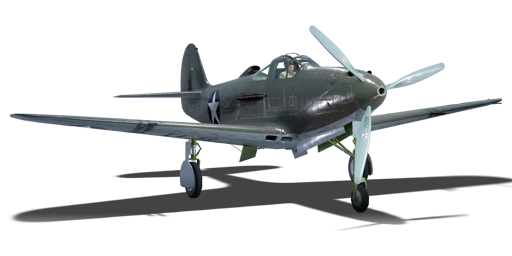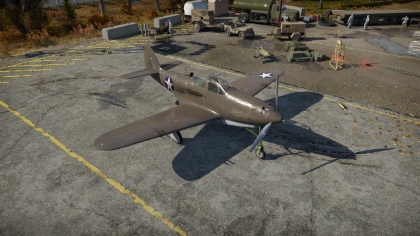Difference between revisions of "P-39N-0"
m (→History: - Added more information and corrected a few grammar mistakes.) (Tag: Visual edit) |
|||
| Line 242: | Line 242: | ||
* ''other literature.'' | * ''other literature.'' | ||
| + | {{AirManufacturer Bell}} | ||
{{USA fighters}} | {{USA fighters}} | ||
Revision as of 17:54, 30 December 2019
Contents
| This page is about the American fighter P-39N-0. For other uses, see P-39 (Family). |
Description
The P-39N-0 Airacobra is a rank II American fighter
with a battle rating of 3.3 (AB), 2.7 (RB), and 3.0 (SB). It has been in the game since the start of the Open Beta Test prior to Update 1.27.
The primary purpose of a P-39 is that of a low-level interceptor against low energy aircraft. It lacks the high-altitude performance needed to engage strategic bombers. The 37 mm M4's dropping trajectory and slow rate of fire make it useless in head-on passes. Therefore, prioritise low altitude objectives, like escorting attackers or low-alt bombers, or prey on the ones of the enemy.
General info
Flight performance
Describe how the aircraft behaves in the air. Speed, manoeuvrability, acceleration and allowable loads - these are the most important characteristics of the vehicle.
| Characteristics | |||||||
|---|---|---|---|---|---|---|---|
| Stock | |||||||
| Max Speed (km/h at 3,048 m) |
Max altitude (meters) |
Turn time (seconds) |
Rate of climb (meters/second) |
Take-off run (meters) | |||
| AB | RB | AB | RB | AB | RB | ||
| 613 | 593 | 9700 | 18.9 | 19.9 | 10.5 | 10.5 | 280 |
| Upgraded | |||||||
| Max Speed (km/h at 3,048 m) |
Max altitude (meters) |
Turn time (seconds) |
Rate of climb (meters/second) |
Take-off run (meters) | |||
| AB | RB | AB | RB | AB | RB | ||
| 680 | 641 | 9700 | 17.8 | 18.0 | 21.2 | 14.9 | 280 |
Details
| Features | ||||
|---|---|---|---|---|
| Combat flaps | Take-off flaps | Landing flaps | Air brakes | Arrestor gear |
| ✓ | ✓ | ✓ | X | X |
| Limits | ||||
|---|---|---|---|---|
| Wing-break speed (km/h) |
Gear limit (km/h) |
Combat flaps (km/h) |
Max Static G | |
| + | - | |||
| 450 | ~12 | ~9 | ||
| Optimal velocities | |||
|---|---|---|---|
| Ailerons (km/h) |
Rudder (km/h) |
Elevators (km/h) |
Radiator (km/h) |
| < 360 | < 380 | < 450 | > 312 |
| Compressor (RB/SB) | ||
|---|---|---|
| Setting 1 | ||
| Optimal altitude | 100% Engine power | WEP Engine power |
| 2,800 m | 1,125 hp | 1,446 hp |
Survivability and armour
- 15.87 mm Steel - Propeller hub
- 15.87 mm Steel - Plate in front of the cockpit
- 7 mm Steel - Plate over instrument cluster
- 6 mm Steel - Upper pilot's seat and headrest encasement
- 6 mm Steel - Rear tail
- 38 mm Bulletproof glass - Windscreen
- 64 mm Bulletproof glass - Headrest of pilot's seat
Armaments
Offensive armament
The P-39N-0 is armed with:
- 1 x 37 mm M4 cannon, nose-mounted (30 rpg)
- 2 x 12.7 mm Browning M2 machine guns, nose-mounted (200 rpg = 400 total)
- 4 x 7.62 mm Browning machine guns, wing-mounted (500 rpg outer + 1,000 rpg inner = 3,000 total)
Suspended armament
The P-39N-0 can be outfitted with the following ordnance:
- Without load
- 6 x M8 rockets
Usage in battles
Basic dogfighting skills apply. Use energy tactics and only fire the cannon under optimum conditions. A separate key for the main gun is advised. Otherwise, utilise the given machine guns at every opportunity. Especially those 7.62 mm light machine guns in the wings, with 3,000 rounds you wont run dry that fast. The center/cowling mounted .50 cals provide great long range accuracy & harassment.
"Jack of all trades, master of none" is the credo of the Airacobra. Thus the basic tactic is to analyse your opponent's weakness and then exploit it. The P-39 will always find an area in which to exceed the foe, or at least is enough of a match to allow pilot skill to dictate the outcome of the engagement. Given the P-39's sleek and rather aerodynamic form, BnZ is the preferred form of combat. However TnB is an option as well. Again, the P-39 provides all the options a pilot could want: "Jack of all traits, master of none".
Manual Engine Control
| MEC elements | ||||||
|---|---|---|---|---|---|---|
| Mixer | Pitch | Radiator | Supercharger | Turbocharger | ||
| Oil | Water | Type | ||||
| Controllable | Controllable Not auto controlled |
Controllable Not auto controlled |
Controllable Not auto controlled |
Separate | Not controllable 1 gear |
Not controllable |
Modules
| Tier | Flight performance | Survivability | Weaponry | ||
|---|---|---|---|---|---|
| I | Fuselage repair | Radiator | Offensive 7 mm | ||
| II | Compressor | Airframe | New 7 mm MGs | Offensive 12 mm | |
| III | Wings repair | Engine | Offensive 37 mm | New 12 mm MGs | |
| IV | Engine injection | Cover | New 37 mm cannons | Rocket Launcher M10 | |
Pros and cons
Pros:
- Heavy armament
- Great dive speed and acceleration
- Reasonable turn time
- Great amount of 7.62 (.306) ammo (750 rpg)
Cons:
- "Jack of all trades, but master of none"
- Three different weapon trajectories make aiming difficult, although this is less of a problem if you are a proficient P-400 pilot
- Long countdown for the 37 mm in both overheating and reload
- Easy to stall with full controls
- Cannot fire the 2 MGs separately
- Ammunition count for the M2s is low, limiting their usage time
History
The P-39 Airacobra was a single-engine fighter used in the Pacific and Eastern fonts. The aircraft was produced 1940 – May 1944, and its first flight was 6 April 1938. The manufacturer of this aircraft was Bell Aircraft. As mentioned before in the intro this aircraft is great in low attitude combat making it useful in naval battles for escorting torpedo bombers. The original idea for the Airacobra was a defensive interceptor which would protect American shores for the axis powers. Destroying low flying torpedo and normal bombers was a wet dream for this aircraft has it could easily ripe the wings and tail. The plane originally was sent to Britain but has aircraft became more powerful and dogfights where happening higher and higher in the atmosphere and it was sent back to the states. The US then gave the P-39 Airacobra to the Aussies and was used to patrol the northern shores of Australia. The aircraft later was fitted with bombs and more cannons forcing it into a ground pounding role has it could now pen some tanks of the 1939-1942 era. Today P-39 Airacobra can be found in the Air force museum and others around the world.
In-game description
Bell's P-39 Airacobra was a WWII-era American fighter that was notable for its uncommon design: the engine was placed behind the cockpit, and the landing gear moved from the tail to the nose. The aircraft was adopted by five countries: USA, Britain, Soviet Union, Portugal and Australia.
The P-39N was the first variant to be mass produced, with the P-39N-0 getting a new V-1710-85(E19) engine and a 3-blade Aeroproducts propeller with a 3.15 meter diameter. Starting from aircraft #167, some fuel tanks were removed from the wings to reduce weight, and a connection for additional fuel tanks was installed under the hull. To further increase flight performance, Soviet engineers often removed the wing-mounted machine guns, leaving two nose machine guns and a cannon.
As this variant, Bell produced 2,095 aircraft. Most of these were sent to the Soviet Union on the US's Lend-Lease program. In November 1942, the USSR received the first Airacobras, and the fighters showed good results in battle maneuvers at low and moderate altitudes. Many famous Soviet aces — such as Pokrishkin Alexander Ivanovich, Rechkalov Gregory Andreevich, Gulaev Dmitry Nikolaevich and Kutakhov Pavel Stepanovich — piloted the Airacobras during WWII.
Media
Excellent additions to the article would be video guides, screenshots from the game, and photos.
See also
Links to the articles on the War Thunder Wiki that you think will be useful for the reader, for example:
- reference to the series of the aircraft;
- links to approximate analogues of other nations and research trees.
External links
Paste links to sources and external resources, such as:
- topic on the official game forum;
- encyclopedia page on the aircraft;
- other literature.
| Bell Aircraft Corporation | |
|---|---|
| Aircraft | |
| Fighters | P-39N-0 · P-39Q-5 |
| P-400 | |
| P-63A-10 · P-63A-5 · P-63C-5 · ␠Kingcobra | |
| Jet Fighters | P-59A |
| Export | ▂P-39K-1 · ▂Pokryshkin's P-39N-0 · ▂P-39Q-15 · ▄P-39Q-25 |
| ▂P-63A-5 · ▂P-63A-10 · ▂P-63C-5 · ▄P-63C-5 | |
| Helicopters | |
| Attack | AH-1F · AH-1G · AH-1Z · AH-1W |
| OH-58D | |
| Utility | UH-1B · UH-1C · UH-1C XM-30 |
| Export/Licensed | ▅UH-1B · ◄UH-1D |
| Tzefa A · Tzefa B · Tzefa D/E · ▅AH-1S early · ▅AH-1S · ▅AH-1S Kisarazu · ␗AH-1W | |
| ␗OH-58D | |
| See Also | Fuji Heavy Industries · Agusta |
| USA fighters | |
|---|---|
| P-26 Peashooter | P-26A-33 · P-26A-34 · P-26A-34 M2 · P-26B-35 |
| P-36 Hawk | P-36A · Rasmussen's P-36A · P-36C · ○P-36C · P-36G |
| P-39 Airacobra | P-400 · P-39N-0 · P-39Q-5 |
| P-40 | P-40C · P-40E-1 · P-40E-1 TD · P-40F-10 |
| P-43 Lancer | P-43A-1 |
| P-47 Thunderbolt | P-47D-22-RE · P-47D-25 · P-47D-28 · P-47M-1-RE · ⋠P-47M-1-RE · P-47N-15 |
| P-51 Mustang | P-51 · P-51A (Thunder League) · P-51C-10 · P-51D-5 · P-51D-10 · P-51D-20-NA · P-51D-30 · P-51H-5-NA |
| P-63 Kingcobra | P-63A-5 · P-63A-10 · P-63C-5 · ␠Kingcobra |
| Prototypes | XP-55 |
| F2A Buffalo | F2A-1 · Thach's F2A-1 · F2A-3 |
| BF2C | BF2C-1 |
| F3F | F3F-2 · Galer's F3F-2 |
| F4F Wildcat | F4F-3 · F4F-4 |
| F4U Corsair | F4U-1A · F4U-1A (USMC) · F4U-1D · F4U-1C · F4U-4 · F4U-4B · F4U-4B VMF-214 · F2G-1 |
| F6F Hellcat | F6F-5 · F6F-5N |
| F8F Bearcat | F8F-1 · F8F-1B |
| Other countries | ▃Ki-43-II · ▃Ki-61-Ib · ▃A6M2 · ▃Bf 109 F-4 · ▃Fw 190 A-8 · ▃Spitfire LF Mk IXc |





